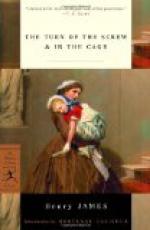to forget. The girl was blasee; nothing could
belong more, as she perfectly knew, to the intense
publicity of her profession; but she had a whimsical
mind and wonderful nerves; she was subject, in short,
to sudden flickers of antipathy and sympathy, red
gleams in the grey, fitful needs to notice and to “care,”
odd caprices of curiosity. She had a friend who
had invented a new career for women—that
of being in and out of people’s houses to look
after the flowers. Mrs. Jordan had a manner of
her own of sounding this allusion; “the flowers,”
on her lips, were, in fantastic places, in happy homes,
as usual as the coals or the daily papers. She
took charge of them, at any rate, in all the rooms,
at so much a month, and people were quickly finding
out what it was to make over this strange burden of
the pampered to the widow of a clergyman. The
widow, on her side, dilating on the initiations thus
opened up to her, had been splendid to her young friend,
over the way she was made free of the greatest houses—the
way, especially when she did the dinner-tables, set
out so often for twenty, she felt that a single step
more would transform her whole social position.
On its being asked of her then if she circulated only
in a sort of tropical solitude, with the upper servants
for picturesque natives, and on her having to assent
to this glance at her limitations, she had found a
reply to the girl’s invidious question.
“You’ve no imagination, my dear!”—that
was because a door more than half open to the higher
life couldn’t be called anything but a thin partition.
Mrs. Jordan’s imagination quite did away with
the thickness.
Our young lady had not taken up the charge, had dealt
with it good-humouredly, just because she knew so
well what to think of it. It was at once one
of her most cherished complaints and most secret supports
that people didn’t understand her, and it was
accordingly a matter of indifference to her that Mrs.
Jordan shouldn’t; even though Mrs. Jordan, handed
down from their early twilight of gentility and also
the victim of reverses, was the only member of her
circle in whom she recognised an equal. She
was perfectly aware that her imaginative life was the
life in which she spent most of her time; and she
would have been ready, had it been at all worth while,
to contend that, since her outward occupation didn’t
kill it, it must be strong indeed. Combinations
of flowers and green-stuff, forsooth! What she
could handle freely, she said to herself, was combinations
of men and women. The only weakness in her faculty
came from the positive abundance of her contact with
the human herd; this was so constant, it had so the
effect of cheapening her privilege, that there were
long stretches in which inspiration, divination and
interest quite dropped. The great thing was the
flashes, the quick revivals, absolute accidents all,
and neither to be counted on nor to be resisted.
Some one had only sometimes to put in a penny for




